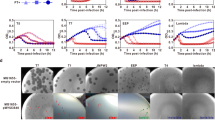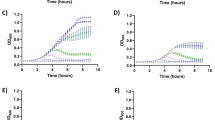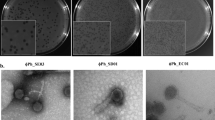Abstract
The Escherichia coli (E. coli) has been widely employed in biotechnology industry and academia. However, the bioproduct manufacturing driven by E. coli is prone to the phage contamination. Good laboratory/factory hygiene may decrease but not avoid completely the chances of the phage contamination. The present study aims to resolve this problem by engineering laboratory/factory-specific phage-resistant E. coli strains. By adding a laboratory or factory derived phage into the atmospheric and room temperature plasma mutagenized E. coli, a phage-resistant strain could be generated. Interestingly, the resistant strain exhibited cross-resistance to unencountered phages. When operating the resistant strain in a polluted environment, the phage contamination was largely prevented. There was no significant difference in heterogeneous protein production between the parental strain and the phage-resistant strain. Importantly, it requires only one day to generate the phage-resistant strain. This practical method for engineering laboratory/factory-specific phage-resistant strains may have great potential in resuming E. coli operation in laboratories and factories during phage contamination outbreaks.
Graphical abstract





Similar content being viewed by others
Data availability
The codon-optimized Haemophilus ducreyi nicotinamide phosphoribosyltransferase with a C-terminal six histidine tag was deposited at GenBank (Accession No: MW759281). The sequencing files in fastq format obtained from whole-genome sequencing of the strain Hd1 were submitted to the NCBI under SRA accession number PRJNA783137. The GenBank accession numbers for the E. coli BL21 reference genome were CP060121.1, CP053602.1, and AM946981.2.
Code availability
Not applicable.
References
Ali Y, Koberg S, Hessner S, Sun X, Rabe B, Back A, Neve H, Heller KJ (2014) Temperate Streptococcus thermophilus phages expressing superinfection exclusion proteins of the Ltp type. Front Microbiol 5:98. https://doi.org/10.3389/fmicb.2014.00098
Baeshen MN, Al-Hejin AM, Bora RS, Ahmed MM, Ramadan HA, Saini KS, Baeshen NA, Redwan EM (2015) Production of biopharmaceuticals in E. coli: current scenario and future perspectives. J Microbiol Biotechnol 25(7):953–962. https://doi.org/10.4014/jmb.1412.12079
Baltz RH (2018) Bacteriophage-resistant industrial fermentation strains: from the cradle to CRISPR/Cas9. J Ind Microbiol Biotechnol 45(11):1003–1006. https://doi.org/10.1007/s10295-018-2079-4
Chen C, Chen H, Zhang Y, Thomas HR, Frank MH, He Y, Xia R (2020) TBtools: an integrative toolkit developed for interactive analyses of big biological data. Mol Plant 13(8):1194–1202. https://doi.org/10.1016/j.molp.2020.06.009
Cheng L, Wang J, Zhao X, Yin H, Fang H, Lin C, Zhang S, Shen Z, Zhao C (2020) An antiphage Escherichia coli mutant for higher production of L-threonine obtained by atmospheric and room temperature plasma mutagenesis. Biotechnol Prog 36(6):e3058. https://doi.org/10.1002/btpr.3058
Damnjanovic D, Vazquez-Campos X, Winter DL, Harvey M, Bridge WJ (2020) Bacteriophage genotyping using BOXA repetitive-PCR. BMC Microbiol 20(1):154. https://doi.org/10.1186/s12866-020-01770-2
Filippov AA, Sergueev KV, He Y, Huang XZ, Gnade BT, Mueller AJ, Fernandez-Prada CM, Nikolich MP (2011) Bacteriophage-resistant mutants in Yersinia pestis: identification of phage receptors and attenuation for mice. PLoS ONE 6(9):e25486. https://doi.org/10.1371/journal.pone.0025486
Flayhan A, Wien F, Paternostre M, Boulanger P, Breyton C (2012) New insights into pb5, the receptor binding protein of bacteriophage T5, and its interaction with its Escherichia coli receptor FhuA. Biochimie 94(9):1982–1989. https://doi.org/10.1016/j.biochi.2012.05.021
Flores CO, Meyer JR, Valverde S, Farr L, Weitz JS (2011) Statistical structure of host-phage interactions. Proc Natl Acad Sci USA 108(28):E288–E297. https://doi.org/10.1073/pnas.1101595108
Jena NR (2012) DNA damage by reactive species: Mechanisms, mutation and repair. J Biosci 37(3):503–517. https://doi.org/10.1007/s12038-012-9218-2
Kleiner M, Hooper LV, Duerkop BA (2015) Evaluation of methods to purify virus-like particles for metagenomic sequencing of intestinal viromes. BMC Genomics 16:7. https://doi.org/10.1186/s12864-014-1207-4
Labrie SJ, Samson JE, Moineau S (2010) Bacteriophage resistance mechanisms. Nat Rev Microbiol 8(5):317–327. https://doi.org/10.1038/nrmicro2315
Li P, Lin H, Mi Z, Xing S, Tong Y, Wang J (2019) Screening of polyvalent phage-resistant Escherichia coli strains based on phage receptor analysis. Front Microbiol 10:850. https://doi.org/10.3389/fmicb.2019.00850
Liu ZQ, Zhang XH, Xue YP, Xu M, Zheng YG (2014) Improvement of Alcaligenes faecalis nitrilase by gene site saturation mutagenesis and its application in stereospecific biosynthesis of (R)-(-)-mandelic acid. J Agric Food Chem 62(20):4685–4694. https://doi.org/10.1021/jf405683f
Los M (2012) Minimization and prevention of phage infections in bioprocesses. Methods Mol Biol 834:305–315. https://doi.org/10.1007/978-1-61779-483-4_19
Mahony J, Kot W, Murphy J, Ainsworth S, Neve H, Hansen LH, Heller KJ, Sorensen SJ, Hammer K, Cambillau C, Vogensen FK, van Sinderen D (2013) Investigation of the relationship between lactococcal host cell wall polysaccharide genotype and 936 phage receptor binding protein phylogeny. Appl Environ Microbiol 79(14):4385–4392. https://doi.org/10.1128/AEM.00653-13
Marco MB, Moineau S, Quiberoni A (2012) Bacteriophages and dairy fermentations. Bacteriophage 2(3):149–158. https://doi.org/10.4161/bact.21868
Maslowska KH, Makiela-Dzbenska K, Fijalkowska IJ (2019) The SOS system: a complex and tightly regulated response to DNA damage. Environ Mol Mutagen 60(4):368–384. https://doi.org/10.1002/em.22267
McKenna A, Hanna M, Banks E, Sivachenko A, Cibulskis K, Kernytsky A, Garimella K, Altshuler D, Gabriel S, Daly M, DePristo MA (2010) The genome analysis toolkit: a MapReduce framework for analyzing next-generation DNA sequencing data. Genome Res 20(9):1297–1303. https://doi.org/10.1101/gr.107524.110
Parent KN, Erb ML, Cardone G, Nguyen K, Gilcrease EB, Porcek NB, Pogliano J, Baker TS, Casjens SR (2014) OmpA and OmpC are critical host factors for bacteriophage Sf6 entry in Shigella. Mol Microbiol 92(1):47–60. https://doi.org/10.1111/mmi.12536
Pejin B, Savic A, Sokovic M, Glamoclija J, Ciric A, Nikolic M, Radotic K, Mojovic M (2014) Further in vitro evaluation of antiradical and antimicrobial activities of phytol. Nat Prod Res 28(6):372–376. https://doi.org/10.1080/14786419.2013.869692
Rostol JT, Marraffini L (2019) (Ph)ighting phages: how bacteria resist their parasites. Cell Host Microbe 25(2):184–194. https://doi.org/10.1016/j.chom.2019.01.009
Shen Q, Yu Z, Zhou XT, Zhang SJ, Zou SP, Xiong N, Xue YP, Liu ZQ, Zheng YG (2021) Identification of a novel promoter for driving antibiotic-resistant genes to reduce the metabolic burden during protein expression and effectively select multiple integrations in Pichia Pastoris. Appl Microbiol Biotechnol 105(8):3211–3223. https://doi.org/10.1007/s00253-021-11195-0
Stern A, Sorek R (2011) The phage-host arms race: shaping the evolution of microbes. BioEssays 33(1):43–51. https://doi.org/10.1002/bies.201000071
Wang T, Zhang X, Bheda P, Revollo JR, Imai S, Wolberger C (2006) Structure of Nampt/PBEF/visfatin, a mammalian NAD+ biosynthetic enzyme. Nat Struct Mol Biol 13(7):661–662. https://doi.org/10.1038/nsmb1114
Wang C, Pfleger BF, Kim SW (2017) Reassessing Escherichia coli as a cell factory for biofuel production. Curr Opin Biotechnol 45:92–103. https://doi.org/10.1016/j.copbio.2017.02.010
Zhang X, Zhang XF, Li HP, Wang LY, Zhang C, Xing XH, Bao CY (2014) Atmospheric and room temperature plasma (ARTP) as a new powerful mutagenesis tool. Appl Microbiol Biotechnol 98(12):5387–5396. https://doi.org/10.1007/s00253-014-5755-y
Zhang X, Zhang C, Zhou QQ, Zhang XF, Wang LY, Chang HB, Li HP, Oda Y, Xing XH (2015) Quantitative evaluation of DNA damage and mutation rate by atmospheric and room-temperature plasma (ARTP) and conventional mutagenesis. Appl Microbiol Biotechnol 99(13):5639–5646. https://doi.org/10.1007/s00253-015-6678-y
Zhou Y, Liang Y, Lynch KH, Dennis JJ, Wishart DS (2011) PHAST: a fast phage search tool. Nucleic Acids Res 39:W347–W352. https://doi.org/10.1093/nar/gkr485
Acknowledgements
This research was supported by the National Key Research and Development Program of China (2020YFC210007), the Fundamental Research Funds for the Provincial Universities of Zhejiang (RF-C2020002), and the Major Research program of Zhejiang Provincial National Natural Science Foundation of China (LD21C050001).
Funding
This research was supported by the National Key Research and Development Program of China (2020YFC210007), the Fundamental Research Funds for the Provincial Universities of Zhejiang (RF-C2020002), and the Major Research program of Zhejiang Provincial National Natural Science Foundation of China (LD21C050001).
Author information
Authors and Affiliations
Contributions
YPX, YGZ, and QS conceived and supervised the project. QS, XTZ, and QG carried out all the experiments and data analyses. QS and YPX are responsible for the preparation and revision of the manuscript. All authors read and approved the final manuscript.
Corresponding author
Ethics declarations
Conflict of interest
The authors declare that they have no conflict of interest.
Ethical approval
Not applicable.
Consent to participate
Not applicable.
Consent to publish
Not applicable.
Additional information
Publisher's Note
Springer Nature remains neutral with regard to jurisdictional claims in published maps and institutional affiliations.
Supplementary Information
Below is the link to the electronic supplementary material.
Rights and permissions
About this article
Cite this article
Shen, Q., Zhou, XT., Guo, Q. et al. Engineering laboratory/factory-specific phage-resistant strains of Escherichia coli by mutagenesis and screening. World J Microbiol Biotechnol 38, 51 (2022). https://doi.org/10.1007/s11274-022-03239-y
Received:
Accepted:
Published:
DOI: https://doi.org/10.1007/s11274-022-03239-y




